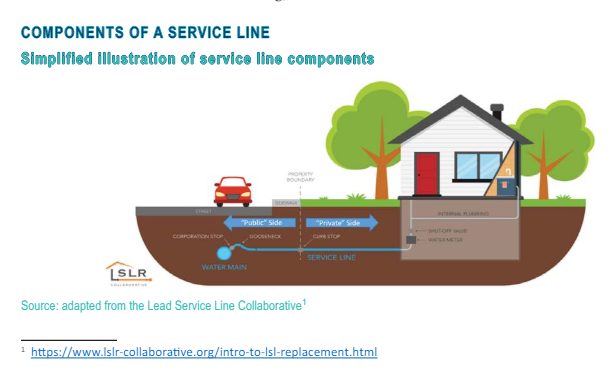Elgin was able to save $1.2 million on its 2023 contract to replace lead water service lines, money that will be poured back into the city’s ongoing effort to remove pipelines at about 10,000 homes, officials said.
The city had expected to pay Five Star Energy Services $4.9 million to replace the lines going into 434 properties through its 2023 Lead Service Line Replacement (LSLR) program, but the cost ended up coming in at $3.6 million.
Part of the savings can be attributed to crews finding that many of city’s public service lines were already made of copper, meaning the street didn’t need to be torn up in order to swap out the lines going into people’s homes, according to Water Director Nora Bertam.
Another factor stemmed from construction crews becoming more efficient at replacing lines as they gained experience, meaning fewer hours were required to do the work, Bertram said.
“It is always great to learn the city has saved money on a construction project in these inflationary times, particularly when that savings has seven figures,” City Manager Rick Kozal said.
Of Elgin’s 30,000 water service lines — the lines that connect homes to the city’s distribution water pipeline — about 10,000 are lead-based.
So far, 1,659 lines have been replaced and the city has a long-term plan to remove the rest, Kozal said.
Work on the 2024 replacement program starts in July. This year, the city anticipates it will replace about 384 lines, with funding for this year and future years coming from a $5 million low-interest loan from the Illinois Environmental Protection Agency, the city’s sale of $10 million in bonds and now the savings from the 2023 program.
If all goes according to plan, Elgin will do about 384 replacements annually until all lead lines in the city are removed.
“The city takes great pride in its LSLR efforts, taking action on LSLR removal two years before the current state legislation mandates as much,” Kozal said. “Public information indicates Elgin leads all Illinois municipalities in lead service line removals.”
Congress banned the use of lead water pipes in 1986, but most of those installed before then were never removed, according to an IEPA report released in 2023. It was estimated there could be anywhere from 686,000 to 1,040,000 lead service lines in Illinois still needing to be replaced at the time the report was issued.
City officials have stressed that lead is not present in the city’s drinking supply, but homes and other buildings constructed before 1986 may have lead water service lines. The lead is encapsulated by scaling inside the pipes, meaning it should not be released into the drinking water unless there is some sort of pipeline disruption, like nearby underground construction or some other type of distubance.
If consumed, lead can be hazardous to the health of adults and children, causing problems like brain damage and behavioral problems, according to the Centers for Disease Control.
Elgin started its replacement program in 2018, two years before state legislation mandated that municipalities create programs to address the issue and that public and private lines be replaced at no cost to the property owner.
The city started replacing lead for copper in public service lines whenever road construction projects were done in the 1980s, Bertam said.
However, because no records were kept showing what public water service lines were replaced, contractors must now first drill an observation hole in the parkway or treebank to see is the public service line is lead or copper, she said.
If both the city’s line and the homeowner’s line are made of lead, the city needs to cut a rectagular hole in the street in addition to securing an easement on the private property so both can be replaced. However, if the city’s line is already copper, only the private side must come out.
Gloria Casas is a freelance reporter for The Courier-News.




